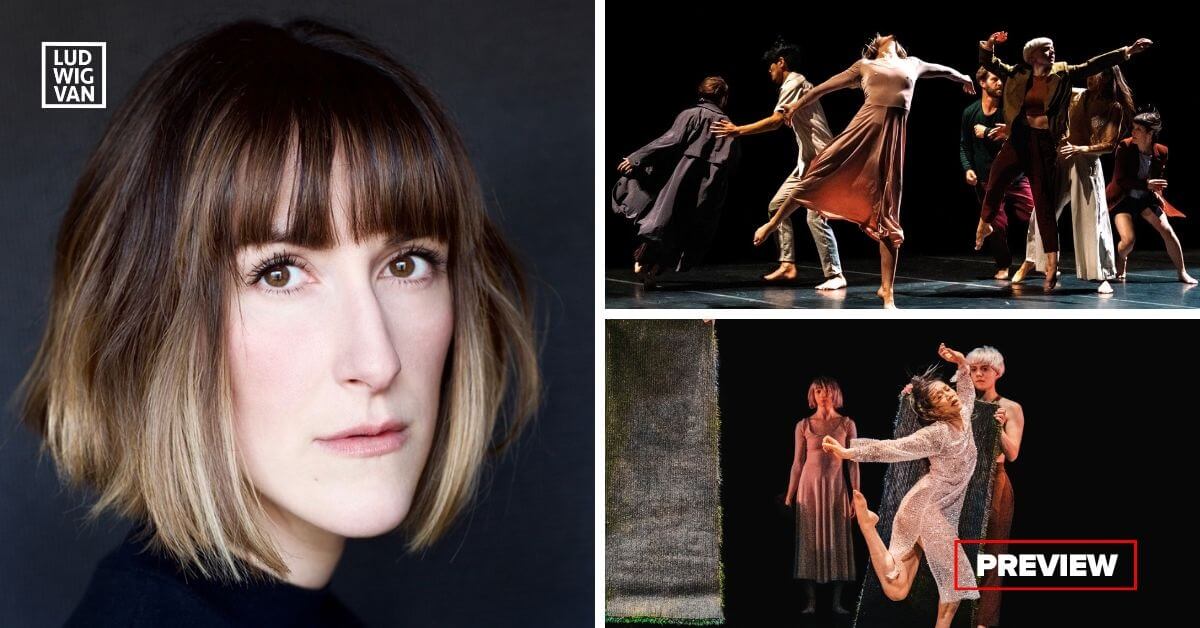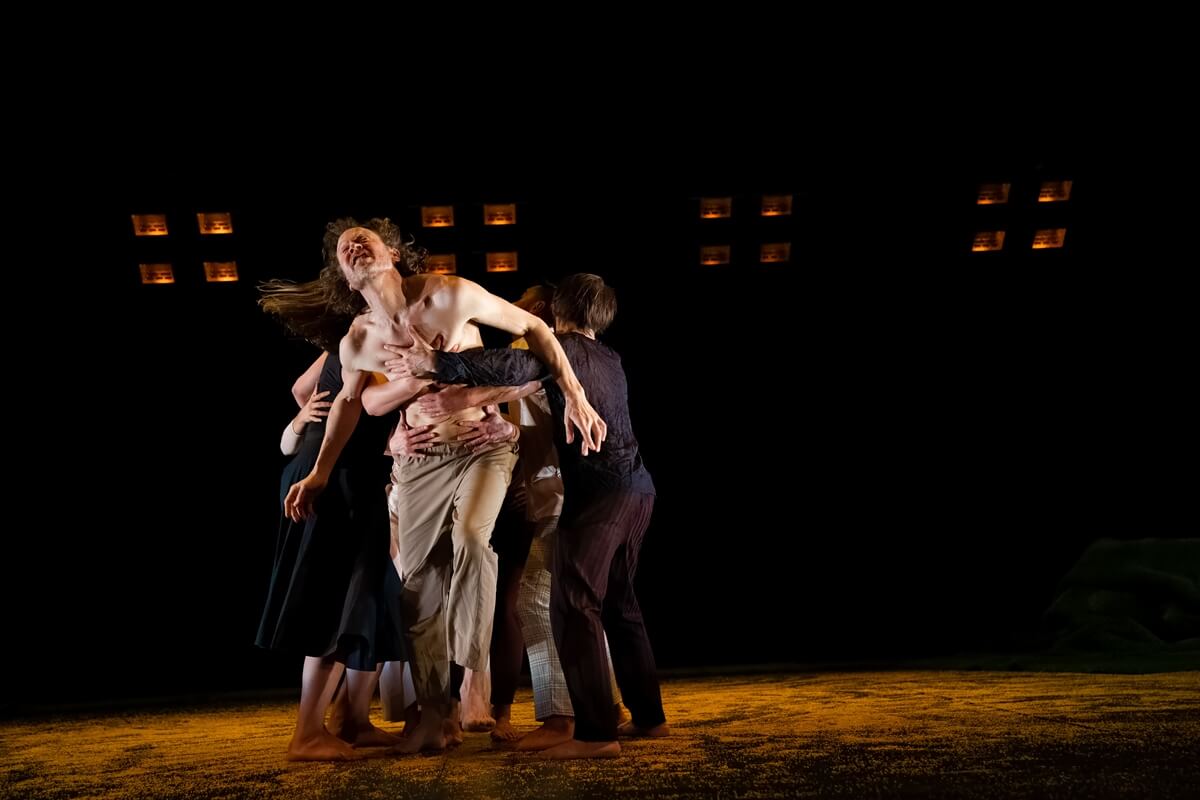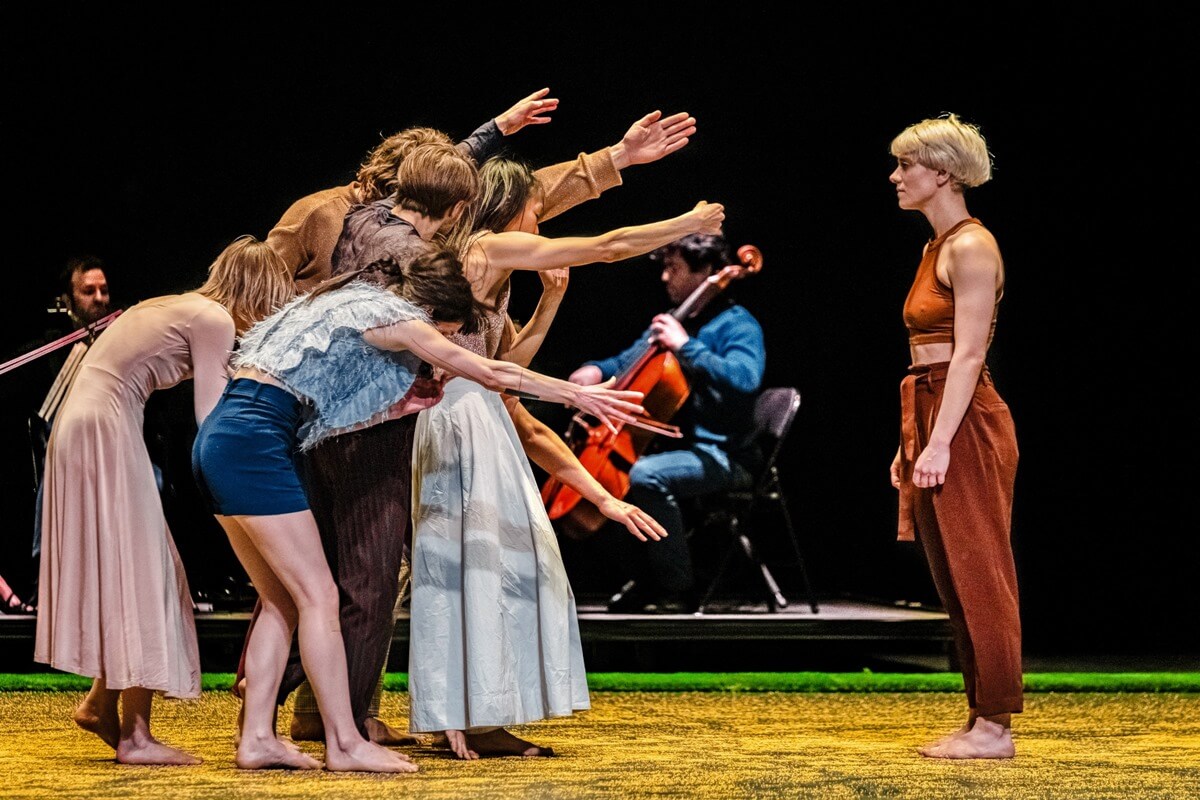
Montréal choreographer Virginie Brunelle is bringing her company to Harbourfront Centre for the Toronto premiere of Les corps avalés. The performances on February 24 and 25 are part of the Torque contemporary dance series.
With the help of a translator, we caught up with Virginie to talk about the piece, which blends contemporary dance with live classical music, performed on stage by the Molinari Quartet. Les corps avalés was first created in 2019, and was well received at its premiere by Danse Danse at the Théâtre Maisonneuve.

Les corps avalés
“In this piece I wanted to talk about a society with a loss of reference,” she explains. “As I like to do, my observation of society — every piece is a different angle of society.”
It’s a piece that combines physicality with a strong musicality to respond to the restless spirit of the times.
“In an era where technological developments should improve communication, it seems that we are gradually becoming disunited.” We become less connected by the speed at which contemporary society runs. Yet, we try to maintain or re-establish those connections. That’s the kind of back and forth that the dance conveys.
In the end, the antidote is love and friendship.
“Through the movement, I wanted to poeticize this range of emotions,” she says. “Humanity is becoming fragile,” she notes. It’s reflected in the dance. “The bodies are swallowed by technology.”
In this age where AI is taking over the media landscape, it seems an especially poignant message. Virginie recalls being asked to create choreography for a robot dog. “I still want to work with humans for now,” she laughs.
Classical music and contemporary dance
Virginie’s path to choreography, as it happens, came through classical music.
“It’s really weird. It arrived really late in my life. I saw my aunt play violin at five. A week later, I said to my mother, I want to play violin.” From age five to 15, she was an active student and then performer. “I learned violin from five years old,” she says. Along with her studies, she performed in a string quartet. “I spent a good part of my life playing music.”
After high school, she met three women who became friends and then mentors and role models. “They brought out my artistic fibre,” she says. “One of them was a performer, a dancer too. She invited me to dance in her show as a non-dancer. I fell in love.”
She studied dance at CEGEP without a background in the field, something she feels might have made her freer to pursue her own vision. Once the course material got to the creative concepts underlying the movement, she was hooked.

Shortly after graduation in 2008, her piece for seven dancers, titled Les cuisses à l’écart du cœur got a lot of attention. Compagnie Virginie Brunelle was founded in 2009, and has since performed throughout Québec as well as internationally.
Her beginnings in music have also come to inform her development as a choreographer. “For me, I think classical music is so rich. [It] already has a dramatic curve.” Once she’s decided on a theme, the music is next. “Actually, the music comes first in my process. I like to do a lot of research in music first.” It’s the music that inspires the movement.
“I really look for correlation between music and dance. It plays an essential role in the conceptualization of my work.” Classical music in particular lends itself to her work. “It has an undeniable narrative function.” As she explains it, the music creates dramatic tension that links the audience members into their own memories.
Les corps avalés gave her the chance to put both her passions together. “It was the first time that I invited live musicians to work on stage with us. It was my most ambitious creation to that point.” It also realized another ambition. “By bringing together two disciplines I cherish — chamber music and dance.” Using classical music is like coming home. “It’s like a double show for me.”
The Molinari Quartet, founded in 1997, are dedicated to performing the work of 20th and 21st century composers. “I chose Molinari Quartet for their rigour and their talent.” The combination creates a unique kind of performance. “It brings something really alive, both for the musicians and dance,” she says. “On se lance la balle.”
Her choreography uses familiar music and recognizable gestures. “For me, in each piece, I try to create a bridge between the audience and the scene,” she says. “I try to create a dialogue with the audience, so they can create some reference with their own experience and their own baggage.”
“I don’t want only one interpretation.”
Tickets to the performances are on sale here.
#LUDWIGVAN
Get the daily arts news straight to your inbox.
Sign up for the Ludwig van Daily — classical music and opera in five minutes or less HERE.
- INTERVIEW | Baritone Alfred Walker & Soprano Janai Brugger Talk About Singing Cherubini’s Medea With The COC - April 16, 2024
- PREVIEW | JUNO Award-Winning Ensemble Constantinople Focuses On The Work Of Dimitrie Cantemir - April 15, 2024
- THE SCOOP | The Philadelphia Orchestra String Quartet Comes To ScarboroughFor Free Event On April 16 - April 15, 2024



